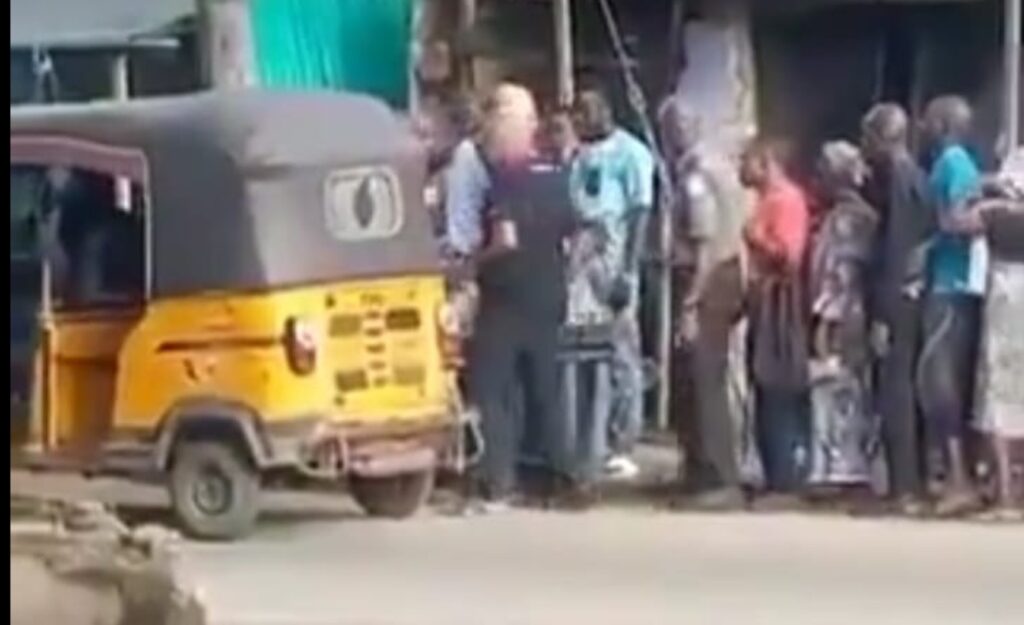That people can queue for free bread on the street mirrored the dire situation most households are subjected to under President Bola Tinubu-led Nigerian government

Lagos – A white man was sighted on the street of Lagos, distributing loaves of bread to residents who queued for the free staple, in a development that highlights the extent to which citizens were battered by hunger amid the nation’s worst cost-of-living crisis under President Bola Tinubu-led Nigerian government.
As seen in a viral video, the white man, whose identity has not been known, donned a blue shirt on grey trousers as he handed out loaves to people standing in an orderly queue at 48, Asa-Afariogun Street, Ajao Estate in Lagos.
Sources said the white man had earlier in the day shared bibles to interested individuals prior to giving out the bread loaves.
He reportedly bought the loaves from Exclusive Bakery in the estate. Each bread costs ₦1,200.
The amount of loaves the white man purchased could not be ascertained, but the owners of Exclusive Bakery appreciated the white man’s patronage, noting that they didn’t know his identity.
One of the queues seen on social media stretched 30 metres long and had dozens of residents waiting their turns for a loaf of bread.
NIGERIA ECONOMY CRISIS
That people can queue for free bread on the street mirrored the dire situation most households are subjected to under President Bola Tinubu-led Nigerian government.
Nigeria’s headline inflation rate in September 2024 rose to 32.70%, up from 32.15% in August 2024, marking a 0.55% increase month-on-month, according to the National Bureau of Statistics (NBS).
The country is facing its worst economic crisis in decades, with skyrocketing inflation, the national currency in free-fall and millions of people struggling to buy food. Only two years ago Africa’s biggest economy, Nigeria is projected to drop to fourth place this year.
The pain is widespread. Unions strike to protest salaries of around $20 a month. People die in stampedes, desperate for free sacks of rice. Hospitals are overrun with women wracked by spasms from calcium deficiencies.
Although, Tinubu increased the minimum wage — after strike action and months-long negotiations with labour unions — from ₦30,000 to ₦70,000, his government has increased spending for officials at a time of nationwide starvation.
For workers earning the new ₦70,000, or $43 per month minimum wage, capricious inflation and naira value have inflicted too much damage for the changes to make any difference in their lives.
The crisis is largely believed to be rooted in two major changes implemented by Tinubu, who took over office 17 months ago; the partial removal of fuel subsidies and the floating of the currency, which together have caused major price rises.
Over a year after Tinubu declared end to fuel subsidy, the fuel price which had been hiked a few times during his first year in office, officially hit the ₦1,000 mark in early October, as oil marketers including state-run Nigerian National Petroleum Corporation (NNPC) Limited, adjusted their pumps in Abuja to ₦1,030 per litre and those in Lagos State did to ₦998, compounding the woes of the citizens who power their vehicles, and generating sets with petrol, no thanks to decades-long epileptic electricity supply.
This follows after the NNPC Limited withdrew from being middleman between the oil marketers and the Aliko Dangote-owned refinery for the supply of fuel.
Dangote had also urged the president to fully hand off fuel subsidy.
In recent weeks, the nation has suffered an acute fuel scarcity that led some outlets with fuel to sell at exorbitant prices above ₦1,100 per litre while black market prices exceeded ₦1,300.
A nation of entrepreneurs, Nigeria’s more than 200 million citizens are skilled at managing in tough circumstances, without the services states usually provide. They generate their own electricity and source their own water. They take up arms and defend their communities when the armed forces cannot. They negotiate with armed kidnappers when family members are abducted.
But right now, their resourcefulness is being stretched to the limit.
Police and other security agencies clamped down on protests after citizens frustrated by the high cost of living repeatedly took to the streets, demanding that the government do more to help the vulnerable.
In August, Amnesty International accused Nigerian security forces of killing at least 21 protesters during a week of economic hardship protests. Security forces denied responsibility for deaths during the protests.
($1 = ₦1,643.36)

God bless you sir KOIKIMEDIA BRINGING THE WORLD CLOSER TO YOUR DOOR STEP 🫡🫡🫡🫡
[…] days ago, a white man was filmed on the street of Lagos, distributing loaves of bread to residents who queued…, in a development that highlights the extent to which citizens were battered by hunger amid the […]